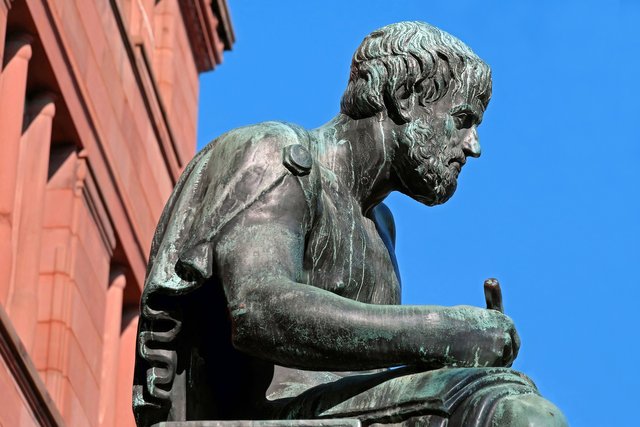Moral Virtue Is Like a Muscle! (Aristotle, The Nichomachean Ethics)
What is moral virtue? According to Aristotle (384 B.C. - 322 B.C.), an ancient Greek philosopher, it is the measure of how we act, both in our dealing with others and towards situations that arise in our lives. To build moral virtue is to repeatedly do acts that constitute moral virtue, or as Aristotle puts it:
Men become builders by building and lyre-players by playing the lyre; so too we become just by doing just acts.
And what of virtue itself? Aristotle presents virtue as a sort of spectrum, with the opposite ends being deficiency and excess, and the sweet spot being right in the middle. But how should we view such an intangible, theoretical concept? Aristotle makes it clear that he prefers to think about these concepts with analogies.
For the man who flies from and fears everything and does not stand his ground against anything becomes a coward, and the man who fears nothing at all but goes to meet every danger becomes rash

Thus, Aristotle defines the process of building our character as the process of making better decisions about how to act and think, until those better actions and thoughts become habits themselves:
By doing the acts that we do in our transactions with other men we become just or unjust, and by doing the acts that we do in the presence of danger, and by being habituated to feel fear or confidence, we become brave or cowardly.
How should one go about cultivating moral virtue?
Aristotle presents moral virtue in the form of a spectrum, with 'too little' of the desired virtue on one end and 'too much' on the other. Both states, one in excess and one lacking, create an undesirable outcome in that area. For example, in the case of courage, Aristotle says:
For the man who flies from and fears everything and does not stand his ground against anything becomes a coward, and the man who fears nothing at all but goes to meet every danger becomes rash
How does one cultivate moral virtue?
The first step in cultivating moral virtue is identifying the correct action in each situation, the goal being to find the happy medium between the two extremes of excess and defect. Once again, Aristotle uses an analogy to help us better understand his thoughts:
It is the nature of such things to be destroyed by defect and excess, as we see in the case of strength and health… drink or food which is above or below a certain amount destroys the health, while that which is proportionate both produces and increases and preserves it.
And so in the same way that a performance athlete wishes to engage in the perfect amount of eating and drinking to maintain their weight and physique, we should desire to approach our actions like this in every area of our lives. But how exactly do we figure out how to act in each unique situation?
This, argues Aristotle, is the hard part: one for which there isn't a clear answer. And so he advises that one must begin to approach their life as a sort of 'doctor of virtue,' attempting to diagnose their own actions and reactions. Although a doctor doesn't know exactly what is wrong with a patient when they first come in, they can figure it out through the diagnostic process. In the same way, we must scrutinize our habits to determine where they fall on the spectrum of virtue.
In this way, Aristotle says we can think about each virtue as a different muscle. Through each right action we strengthen the muscle, and through each relapse of a bad action, we weaken the muscle. The more thought you put in to your actions, the more correct your actions will become, and in turn the quicker you will grow that muscle.
Eventually, with a bit of practice, Aristotle claims that the fruits of your labor will begin to pay off in pleasure:
Pleasure in doing virtuous acts is a sign that the virtuous disposition has been acquired.
Thanks for your good posts, I followed you! I give you a vote!
Congratulations @tylerkmwilliams! You have received a personal award!
Click on the badge to view your Board of Honor.
Congratulations @tylerkmwilliams! You received a personal award!
You can view your badges on your Steem Board and compare to others on the Steem Ranking
Vote for @Steemitboard as a witness to get one more award and increased upvotes!